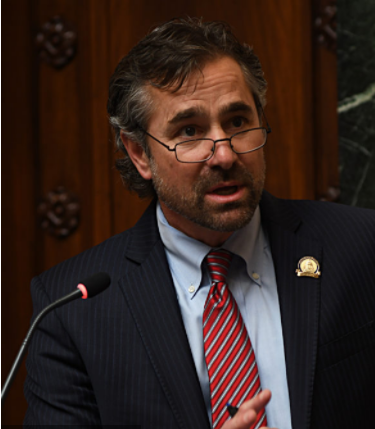
Kentucky House Majority Whip Chad McCoy sponsored HB9, which would provide a permanent funding mechanism for charter schools by allowing sate and local funding allocated to traditional district schools to follow students who enroll in a charter school.
An override of Gov. Andy Beshear’s veto Wednesday night could clear the way for charter schools to open in Kentucky, five years after they were made legal in the Bluegrass State.
The House voted 52-46 to send House Bill 9, sponsored by House Majority Whip Chad McCoy. The Senate later voted 22-15 to override Beshear's veto, making the measure law.
Kentucky is one of six states that allows its legislature to override a veto with a simple majority vote in both houses, which Republicans currently control.
HB 9 would provide a permanent funding mechanism for charter schools by allowing state and local funding allocated to district schools to follow the student if the student enrolls in a charter school.
It also provides charter school pilot programs in Louisville and northern Kentucky.
Lawmakers approved charter schools in 2017, but none have opened because no funding stream was approved. HB 9, sponsored by McCoy, R-Bardstown, was an attempt to remedy that.
McCoy said the locations for the pilots were chosen based on the greatest need. He agreed with a group of faith leaders who supported HB 9 and said, “we are failing the minority kids in the West End of Louisville when it comes to education."
“My hope is that if we run a pilot project, maybe we can get one there that show the rest of the state there’s nothing to be afraid of, these things are going on all over the country, and they’re not going to hurt public schools,” he said during a March 23 debate.
(You can listen to a reimaginEDonline podcast of McCoy talking about the successful override of Beshear’s veto of a 2021 bill that established an income-based education savings account program here.)
The override of HB 9 came nearly a week after Beshear announced his veto at a news conference.
“I’m against charter schools,” Beshear, a Democrat, told reporters as he fulfilled an earlier pledge to veto the bill, which initially passed both chambers by thin margins. Beshear called charter schools, which are publicly funded but privately operated, “wrong for our commonwealth.”
Echoing the criticisms of opponents and teachers’ unions, Beshear said, “they take taxpayer dollars away from already underfunded schools.” He added that the bill would likely be found unconstitutional if challenged in court.
The Network for Public Education, a national group that opposes charter schools, has promised to file a lawsuit. But supporters of charter schools and education choice praised the new law as a victory for families.
“We appreciate the legislators, who, with their vote finalizing the funding of public charter schools in the commonwealth, rejected the fearmongering displayed throughout this debate opponents of school choice,” the Bluegrass Institute said in a statement issued shortly after the vote.
“Kentucky’s parents will now have access to these innovative public schools just like families in 44 other states including our neighboring states —and the District of Columbia.”
Todd Ziebarth, senior vice president of advocacy and support for the National Alliance of Public Charter Schools, called equitable funding for charters “essential” and said, “We are thrilled that Kentucky is finally providing charter school students with the funding they deserve.”
According to the organization, charter schools serve underserved communities and do an exceptional job. Data show almost 70% of charter school students are students of color compared to about 53% of district school students.
A study by Stanford University’s Center for Research on Education Outcomes found that in urban charter schools, low-income Latino students gained 48 additional days in math and 25 additional days in reading per year, while low-income Black students gained 44 additional days in reading and 59 additional days in math per year.

Kentucky GOP Rep. Chad McCoy sponsored House Bill 9, which would establish permanent funding for charter schools.
Calling them “wrong for our commonwealth,” Kentucky Gov. Andy Beshear on Thursday vetoed a bill that would establish funding needed to launch public charter schools.
“I’m against charter schools,” the Democratic governor said at his weekly news conference where he fulfilled his pledge to veto House Bill 9, which passed both chambers of the Legislature by thin margins. “They take taxpayer dollars away from already underfunded schools in the commonwealth.” A Republican priority, the bill would set up long-term funding for charter schools. Public charters, like district schools, would receive a mix of state and local tax support.
The bill would also require that at least two charter schools be created under pilot projects, one in Louisville and the other in northern Kentucky.
The veto drew strong criticism from one of the nation’s largest charter school groups.
“We are deeply disappointed in Governor Beshear. He is clearly letting his ties to special interest groups interfere with his duty to best serve Kentucky students and families,” said Todd Ziebarth, senior vice president of state advocacy and support for the National Alliance for Public Charter Schools. “Many studies and overwhelming parent demand prove public charter schools work for millions of families across the country. Kentucky’s charter school law has been on the books since 2017, and it is time to permanently fund these unique, innovative public schools.”
The National Alliance is urging the Kentucky Legislature to stand strong for Kentucky students and override the veto.
The Kentucky Legislature authorized charter schools in 2017, but none were created because lawmakers created no permanent funding mechanism. House Bill 9 was an attempt to do that.
The bill was sponsored by Rep. Chad McCoy, R-Bardstown, who last year sponsored a bill that created a $25 million tax credit scholarship fund giving eligible families the ability to pay for private school tuition, tutoring and other educational expenses. The bill also gave families the option to choose a different public school district. McCoy discussed the bill on a reimaginED online podcast last year.
Beshear also vetoed that bill. The Legislature overrode the veto, but the new law now faces a court challenge from the Council for Better Education, which opposes education choice.
“This is another option for our public schools to give parents a choice, to send their kids somewhere that the parent thinks is a better option for their child,” McCoy said during a debate.
The goal is that the pilot projects "show the rest of the state there’s nothing to be afraid of,” he said.
During his veto announcement, the governor warned that if passed, the bill would likely prompt a court challenge. Like other charter school opponents, he also claimed they divert money from traditional district schools into charter schools, which he says lack oversight and accountability.
Not true, supporters argue. According to a report last year by the Fordham Institute, in most states an increase in the percentage of students attending independent charter schools was associated with a significant increase in their host districts’ total revenue per pupil, total spending per pupil, local revenue per pupil, and per-pupil spending on support services.
Kentucky lawmakers will have a chance to override the veto of HB 9 when they reconvene next week for the final two days of this year's legislative session. The charter schools bill splintered the GOP ranks, with 22 House Republicans joining Democrats to oppose the proposal last month. Kentucky is one of six states that require only a simple majority in each chamber to override a veto.

Kentucky House Majority Whip Chad McCoy presented House Bill 9, which would make changes to the appeal process if a charter school application is denied by a local school board. Kentucky's Republican-led legislature authorized charter schools in 2017 but none have been created because lawmakers did not provide a permanent funding mechanism.
Editor’s note: This article appeared Tuesday in U.S. News & World Report
After years of inaction, charter schools would gain a foothold in Kentucky and be supplied with a permanent funding stream under a bill that won passage Tuesday in the state House.
The bill calling for initial charter school openings cleared the House on a 51-46 vote after a nearly three-hour debate, on the same day the measure barely emerged from a House committee.
Twenty-two Republican lawmakers aligned with Democrats to oppose the proposal, but the measure mustered enough support to advance to the Senate. Republicans have supermajorities in both chambers. Only a handful of days are left to pass the bill in time to ensure lawmakers could take up a promised veto by Democratic Gov. Andy Beshear.
The bill had a bumpy journey through the House, reflecting the hot-button status of charter schools in the Bluegrass State. The measure was removed from one House committee and reassigned to the Education Committee, which underwent a couple of last-minute membership changes before the crucial vote that helped push the bill through committee.
Opponents put up a spirited fight in the full House. During the long debate, Democratic Rep. Angie Hatton said: “You can cut the tension in this room with a knife today.”
Kentucky's Republican-led legislature authorized charter schools in 2017 but none have been created because lawmakers did not provide a permanent funding mechanism. The new measure would set up a long-term funding method for charter schools. Public charters, like traditional public schools, would receive a mix of local and state tax support.
To continue reading, click here.
Kansas: Lawmakers are pushing for two new bills, which include recommendations from the National Alliance of Public Charter Schools, to bring the school choice movement to a state with only 15 charter schools (The Topeka Capital-Journal).
Georgia: Proposed legislation looks to cap the state's private-school tax credit program and limit it to students with a financial need (Atlanta Journal Constitution). A parent-trigger bill that paves the way for traditional public schools to convert to charters also gets a nod from legislators (Atlanta Journal Constitution).
 New Hampshire: The House is set to vote on a measure that could end a Board of Education moratorium on charter schools (New Hampshire Union Leader). More from The Telegraph of Nashua.
New Hampshire: The House is set to vote on a measure that could end a Board of Education moratorium on charter schools (New Hampshire Union Leader). More from The Telegraph of Nashua.
Tennessee: A $4 million Mathematica study finds KIPP students show significant learning gains in reading, math, science and social studies in the first four years (The Commercial Appeal).
Alabama: State school board members offer mixed reactions following the surprise passage of the Alabama Accountability Act, which gives tax credit scholarships to parents who want to remove their children from failing public schools and enroll them in private schools or a non-failing public school (AL.com). Also, a circuit judge blocked the signing of a controversial bill that created tax credit scholarships (The Anniston Star). (more…)
Washington: The new Charter School Commission is attracting candidates from across the state and beyond, including Liz Finne, a lawyer and director of the Center for Education Reform at the Washington Policy Center. The governor and other leaders expect to choose nine volunteers by March 6 (Associated Press). A coalition of educators and community groups filed a legal challenge that questions the constitutionality of Washington's new charter schools law (Associated Press). More from Education Week.
Colorado: With more than 80,000 students enrolled in 190 charter schools, charter leaders try to clear up misconceptions about the school choice option (Reporter-Herald). Douglas County's Choice Scholarship Program does not violate the state Constitution, rules an appeals court. The outcome could have wide-ranging implications for whether vouchers can be used statewide (Associated Press).
 Alabama: Legislators approve tax credit scholarships for students attending failing public schools (Associated Press). More about the "legislative bombshell'' that Republicans called historic and Democrats said was a sleazy "bait and switch,'' at AL.com. And the site offers a primer on the Alabama Accountability Act.
Alabama: Legislators approve tax credit scholarships for students attending failing public schools (Associated Press). More about the "legislative bombshell'' that Republicans called historic and Democrats said was a sleazy "bait and switch,'' at AL.com. And the site offers a primer on the Alabama Accountability Act.
Idaho: Khan Academy will provide math, physics and history classes in 47 public, private and charter schools this fall, making Idaho the nation's first proving ground for statewide implementation of the free online educational content and teaching model (Associated Press).
Michigan: A report measuring charter school performance statewide calls the Eastern Michigan University-authorized schools the second worst system in the state. EMU says the report doesn't take into account that the schools serve some of the state's toughest communities (Ann Arbor.com)
Montana: House Republicans endorse three school choice bills - one to authorize charter schools, another to create a modest tax credit scholarship program and a third to create an education savings account program for students with disabilities (Independent Record). A day later, several defect on the charter school bill and it goes down - though maybe not permanently - on a 50-49 vote (Billings Gazette). The tax credit scholarship bill clears the Senate (The Missoulian).
Florida. U.S. Sen. Marco Rubio, R-Fla., introduces legislation to create a national tax credit scholarship program (redefinED). A parent trigger bill that was defeated last year in a dramatic tie vote is back this year (redefinED).
 Colorado: Two bills to expand private school choice through tax credits go down to defeat (Ed News Colorado). A student is in limbo after his mother withdraws him from a charter school to send him back to his zoned district school but the district says it's too late (9News.com).
Colorado: Two bills to expand private school choice through tax credits go down to defeat (Ed News Colorado). A student is in limbo after his mother withdraws him from a charter school to send him back to his zoned district school but the district says it's too late (9News.com).
Arizona: Charter schools would have to follow state purchasing laws and those that use management companies would have to post salary information under a bill filed in the wake of a newspaper investigation (Arizona Republic). Lawmakers nix a bill that would have required mailers be sent to parents informing them of school choice programs (Arizona Daily Sun).
New Mexico: Public schools, including charter schools, would be barred from contracting with private entities under a bill supported by critics who fear "a Trojan horse-type assault on the state to divert public education funds" (Santa Fe New Mexican).
Idaho: Lawmakers consider equitable funding for charter schools (Idaho Reporter).
Washington: The state public schools superintendent asks legislators to put charters under his watch, a move that conflicts with the new law voters recently approved that calls for a separate supervisory panel (King5).
California: The San Francisco school district triples the rent for charter schools, after charging less than other districts for years, prompting an outcry from some charters (San Francisco Chronicle). (more…)
New Hampshire: The ACLU and Americans United for Separation of Church and State file suit against the state's new tax credit scholarship program (New Hampshire Public Radio). More from Associated Press.
Maine: State Education Commissioner Stephen Bowen points to problems in the process after the state charter school commission rejects four of five applicants (Bangor DailyNews). Gov. Paul LePage tees off on the commission and the teachers union after the rejections (Portland Press Herald). Supporters of virtual charter schools are also upset (Portland Press Herald). The teachers union blasts LePage for wanting to lift the cap on charter schools (Portland Press Herald). Public school administrators say charters should have to feel effect of education budget cuts too (Bangor Daily News).
Kansas: Vouchers, tax credit scholarships and an expansion of charter schools are all expected to be part of the legislative discussion this year (Wichita Eagle.)
Kentucky: A bill is filed to allow a limited number of charter schools to open in the state for the first time (Kentucky Public Radio).
California: Parents at Desert Trails Elementary School finally succeed in using the parent trigger law to get a charter school to take over their school (Los Angeles Times). More from Hechinger Report and Education Week.
Georgia: A state representative is planning to file a parent trigger bill for the session that begins today (Associated Press).
Mississippi: Business leaders are backing the legislative push for charter schools (Associated Press). Racial divisions and mistrust are at play in debate over charter schools (Hechinger Report). (more…)